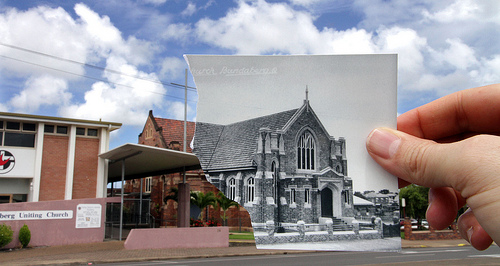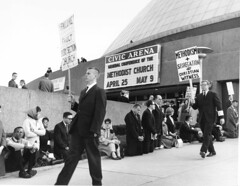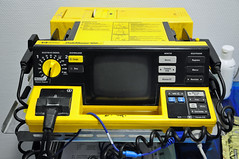Some things never change. There are still hot dogs at baseball games. There are still fish in Kentucky Lake. And there are still Methodists meeting on a yearly basis to talk business and make decisions. In the past two weeks, I’ve been to two Annual Conferences. And, at those sessions, I spoke with pastors and leaders of the Church at length.
Something was different.
In years past, Conference was a coming together of factions. Sounds good, right? “Factions coming together” evokes images of conversation and parley. In fact, this phrase “factions coming together” was usually more like forces engaging for the purpose of skirmish and battle.
But not this year.This year, the Tennessee and Memphis Annual Conferences came together with a different spirit. There was a congeniality present throughout most of the delegation. There was a spirit of creativity that went well beyond worship.
Many of us noticed. Some of us tried to put our finger on it. And the bright minds around one table came up with three possibilities. The Church is in enough trouble that we needed to come together. This isn’t a General Conference year. We have a new Bishop.
The New Guy

Bill McAlilly (center) at the Southeastern Jurisdictional Conference that elected him Bishop. (Photo credit: Lake Junaluska)
The smart money, from the beginning, was on the fresh vision coming from the Episcopal Office. No, I didn’t switch denominations. “Episcopal” is the adjective referring to bishops and things that are “of bishops.” Try saying “bishopish office” or “the bishopal logo” a few times and you’ll see why.
Back to the Bishop: From the outset, this man was obviously embracing a new style and utilizing a different tactic. By the time Conference came about, Bill McAlilly had made the rounds of the districts (several times) and had a feel for the people of Middle and West Tennessee and Western Kentucky.
Rather than stacking him up against all of the other episcopal leaders we’ve had in the past twenty years, I think it is fairer to say that he is a man more closely matched to the needs of his time.
We’ve had leaders who trusted in the accuracy of second-hand information. This bishop has been on the ground taking in the lay of the land for himself. Candidly, this Bishop may ask you which way the wind is blowing, but he’ll likely have a wet finger in the air while he’s asking his next question. And that’s good.
Why would that be good? Because the Memphis Annual Conference has a somewhat checkered past in the area of communicating clearly. While some might say that is a problem of integrity, I’ve found it to be just as often a problem of self-knowledge. We are a Conference made up of folks who are confident that we know the problem and the solution. But our record seems to indicate that we possessed no real grasp of either.
Fewer Darts and Arrows
Not being a General Conference year, we weren’t voting on the raft of resolutions that we normally would. We weren’t choosing delegates, and we weren’t rehashing hot-button topics.
It’s pure conjecture to guess at how this would have impacted the culture of calm and reason that pervaded the sessions I attended. But, I think it would have made a rather large difference. Even with solid leadership, people get crazy when they are crusading for causes and taking on injustices, perceived and otherwise.
So we have to give room to the idea that this was a calm year because of the absence of “pre-General Conference angst.” But I’ve been to other sessions where this was absent. And those sessions were still stress-filled. Those sessions still offered ample opportunity for us to ignore the things that make for peace.
Bigger Fish to Fry
It’s not a secret that the UMC has been in trouble. But whereas the last few sessions of the Memphis Annual Conference have been about conveying that reality, this session finally seemed to be about “what shall we do, then, to prevent this impending crash?”
I know several colleagues have clearly made efforts to stand down issue-driven agendas.
The United Methodist Church has realized, at a fundamental, grass-roots level, that we must focus on the things that count the most. We no longer have the financial, geographic, or human resources to hammer the issues and beat dead horses.
I think we’ve finally realized that we have to come together to make disciples and, in many ways, let the issues deal with themselves.
Does that mean no one is carrying a banner or protesting a cause? No. There are still many, and they are needed to carry the torch. But the majority has taken on the single, most important cause we have: Intentional discipleship.
Convergence
By the time we finished talking, we realized that we had simply been blessed to live in a time when several things had come together. We have a good leader in Bill McAlilly. We have had a break from a divisive conversation. We have a uniting cause.
As these things have come together in the past year, we have discovered a clarity, focus, and alignment that is quite rare in a body as diverse as the United Methodist Church. And the forward movement is downright exhilarating.





















Good commentary. I think that some are beginning to move beyond bureaucratic vision to a spiritual vision. The Apostle James said we must become “doers of the word.” We must become more like children https://www.facebook.com/notes/daniel-david-harstin/doers-of-the-word/10151478601628317
Thanks, David. I agree with your assessment. We’re getting back to the simplicity of telling the story of what Jesus means to us, what God is doing in our lives, and what the Holy Spirit is empowering us to do that we couldn’t do otherwise.
As for being child-like, my only fear is becoming child-ISH. But you’ve met me. You know that’s a constant danger for me. 😉
A very encouraging word……”As these things have come together in the past year, we have discovered a clarity, focus, and alignment that is quite rare in a body as diverse as the United Methodist Church. And the forward movement is downright exhilarating.”